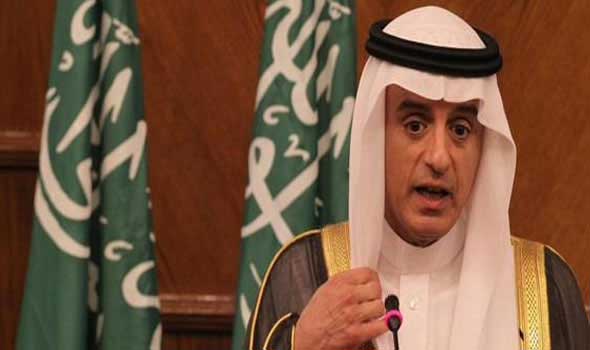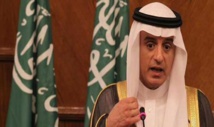As international worries mounted, US Secretary of State John Kerry called his Iranian and Saudi Arabian counterparts, US officials said.
"We are urging calm and de-escalation. The situation needs to be calmed," one official told AFP.
London, Paris and Berlin also expressed concerns, amid fears the dispute could derail efforts to resolve conflicts across the Middle East, from Syria to Yemen.
Moscow offered to act as an intermediary and the UN envoy for Syria headed for Riyadh and Tehran in a bid to defuse tensions.
The crisis has also raised fears of an increase in sectarian violence, including in Iraq where two Sunni mosques were blown up overnight and two people killed.
Saudi Arabia cut ties with Iran late on Sunday, giving diplomats 48 hours to leave the kingdom after protesters set fire to its embassy in Tehran and a consulate in second city Mashhad.
Bahrain and Sudan followed suit on Monday, and the United Arab Emirates also downgraded its ties, recalling its envoy from Tehran.
Sunni Arab nations accused Tehran of repeatedly meddling in their affairs, with Saudi Foreign Minister Adel al-Jubeir saying "Iran's history is full of negative interference and hostility in Arab issues".
Bahrain accused Iran of "increasing flagrant and dangerous meddling" in Gulf and Arab states, while the UAE said Iranian interference had reached "unprecedented levels".
Some 80 Saudis, including diplomats and their families, had already left Iran and arrived in Dubai on Monday, diplomatic sources said.
The Saudi civil aviation authority said that all flights to and from Iran were being suspended.
- 'Hugely concerning' -
Iranian officials denounced the Saudi moves as tactics that would inflame regional tensions.
"Saudi Arabia sees not only its interests but also its existence in pursuing crises and confrontations and (it) attempts to resolve its internal problems by exporting them to the outside," foreign ministry spokesman Hossein Jaber Ansari said.
Iran and Saudi Arabia are on opposing ends of a range of crucial Middle East issues, including the war in Syria -- where Tehran backs President Bashar al-Assad's regime and Riyadh supports rebel forces -- and Yemen where a Saudi-led coalition is battling Shiite insurgents.
The UN peace envoy for Syria, Staffan de Mistura, was due in Riyadh later Monday for talks ahead of a visit to Iran.
"A breakdown of relations between Riyadh and Tehran could have very serious consequences for the region," UN spokesman Stephane Dujarric said.
The spike in tensions comes after Iran last year secured a historic nuclear deal with world powers led by the United States, sparking major concern in longtime US ally Riyadh.
The Cairo-based Arab League said it would hold an emergency meeting at Riyadh's request on Sunday to discuss the attacks on Saudi diplomatic premises and alleged Iranian interference.
British Prime Minister David Cameron called the tensions "hugely concerning", Germany expressed "dismay" and called for the restoration of diplomatic ties, and France urged a "de-escalation of tensions".
Oil prices fell, wiping out gains won earlier on Middle East supply risks, with US benchmark West Texas Intermediate down 53 cents to $36.51 a barrel.
Gulf stocks tumbled, with six of the region's seven exchanges down and the Saudi Tadaul All-Shares Index falling by 2.36 percent.
Iran's President Hassan Rouhani, a moderate, on Sunday criticised those who attacked the diplomatic buildings, calling them radicals, and 50 suspects were arrested.
But the country's supreme leader Ayatollah Ali Khamenei warned Riyadh its rulers would face "quick consequences" for executing Nimr.
Some 3,000 demonstrators rallied in Tehran on Monday, chanting anti-Saudi slogans and burning US and Israeli flags.
- Blasts, protests in Iraq -
In Shiite-majority Iraq, top cleric Grand Ayatollah Ali al-Sistani called Nimr's execution "an unjust act of aggression", and on Monday blasts rocked two Sunni mosques, wounding at least three people.
A man living at one mosque in the town of Hilla was shot dead by unidentified gunmen and a Sunni muezzin -- who recites the Muslim call to prayer -- was shot dead in the city of Iskandariyah, security sources said.
Prime Minister Haider al-Abadi said the perpetrators "targeted mosques to sow sedition and undermine national unity".
Thousands of protesters rallied against Saudi Arabia in Baghdad, demanding that it sever relations with Riyadh.
The 56-year-old Nimr was a force behind 2011 anti-government protests in eastern Saudi Arabia, where Shiites have long complained of marginalisation.
He was among 47 men executed on Saturday, including other Shiite activists and Sunni militants the Saudi interior ministry said were involved in Al-Qaeda attacks that killed dozens in 2003 and 2004.
Executions have soared in Saudi Arabia since King Salman ascended the throne a year ago with 153 people put to death in 2015, nearly twice as many as in 2014, for crimes ranging from murder to drug trafficking, armed robbery, rape and apostasy.
------------------------------------------------------------------------------------------------
"We are urging calm and de-escalation. The situation needs to be calmed," one official told AFP.
London, Paris and Berlin also expressed concerns, amid fears the dispute could derail efforts to resolve conflicts across the Middle East, from Syria to Yemen.
Moscow offered to act as an intermediary and the UN envoy for Syria headed for Riyadh and Tehran in a bid to defuse tensions.
The crisis has also raised fears of an increase in sectarian violence, including in Iraq where two Sunni mosques were blown up overnight and two people killed.
Saudi Arabia cut ties with Iran late on Sunday, giving diplomats 48 hours to leave the kingdom after protesters set fire to its embassy in Tehran and a consulate in second city Mashhad.
Bahrain and Sudan followed suit on Monday, and the United Arab Emirates also downgraded its ties, recalling its envoy from Tehran.
Sunni Arab nations accused Tehran of repeatedly meddling in their affairs, with Saudi Foreign Minister Adel al-Jubeir saying "Iran's history is full of negative interference and hostility in Arab issues".
Bahrain accused Iran of "increasing flagrant and dangerous meddling" in Gulf and Arab states, while the UAE said Iranian interference had reached "unprecedented levels".
Some 80 Saudis, including diplomats and their families, had already left Iran and arrived in Dubai on Monday, diplomatic sources said.
The Saudi civil aviation authority said that all flights to and from Iran were being suspended.
- 'Hugely concerning' -
Iranian officials denounced the Saudi moves as tactics that would inflame regional tensions.
"Saudi Arabia sees not only its interests but also its existence in pursuing crises and confrontations and (it) attempts to resolve its internal problems by exporting them to the outside," foreign ministry spokesman Hossein Jaber Ansari said.
Iran and Saudi Arabia are on opposing ends of a range of crucial Middle East issues, including the war in Syria -- where Tehran backs President Bashar al-Assad's regime and Riyadh supports rebel forces -- and Yemen where a Saudi-led coalition is battling Shiite insurgents.
The UN peace envoy for Syria, Staffan de Mistura, was due in Riyadh later Monday for talks ahead of a visit to Iran.
"A breakdown of relations between Riyadh and Tehran could have very serious consequences for the region," UN spokesman Stephane Dujarric said.
The spike in tensions comes after Iran last year secured a historic nuclear deal with world powers led by the United States, sparking major concern in longtime US ally Riyadh.
The Cairo-based Arab League said it would hold an emergency meeting at Riyadh's request on Sunday to discuss the attacks on Saudi diplomatic premises and alleged Iranian interference.
British Prime Minister David Cameron called the tensions "hugely concerning", Germany expressed "dismay" and called for the restoration of diplomatic ties, and France urged a "de-escalation of tensions".
Oil prices fell, wiping out gains won earlier on Middle East supply risks, with US benchmark West Texas Intermediate down 53 cents to $36.51 a barrel.
Gulf stocks tumbled, with six of the region's seven exchanges down and the Saudi Tadaul All-Shares Index falling by 2.36 percent.
Iran's President Hassan Rouhani, a moderate, on Sunday criticised those who attacked the diplomatic buildings, calling them radicals, and 50 suspects were arrested.
But the country's supreme leader Ayatollah Ali Khamenei warned Riyadh its rulers would face "quick consequences" for executing Nimr.
Some 3,000 demonstrators rallied in Tehran on Monday, chanting anti-Saudi slogans and burning US and Israeli flags.
- Blasts, protests in Iraq -
In Shiite-majority Iraq, top cleric Grand Ayatollah Ali al-Sistani called Nimr's execution "an unjust act of aggression", and on Monday blasts rocked two Sunni mosques, wounding at least three people.
A man living at one mosque in the town of Hilla was shot dead by unidentified gunmen and a Sunni muezzin -- who recites the Muslim call to prayer -- was shot dead in the city of Iskandariyah, security sources said.
Prime Minister Haider al-Abadi said the perpetrators "targeted mosques to sow sedition and undermine national unity".
Thousands of protesters rallied against Saudi Arabia in Baghdad, demanding that it sever relations with Riyadh.
The 56-year-old Nimr was a force behind 2011 anti-government protests in eastern Saudi Arabia, where Shiites have long complained of marginalisation.
He was among 47 men executed on Saturday, including other Shiite activists and Sunni militants the Saudi interior ministry said were involved in Al-Qaeda attacks that killed dozens in 2003 and 2004.
Executions have soared in Saudi Arabia since King Salman ascended the throne a year ago with 153 people put to death in 2015, nearly twice as many as in 2014, for crimes ranging from murder to drug trafficking, armed robbery, rape and apostasy.
------------------------------------------------------------------------------------------------









 Home
Home Politics
Politics











